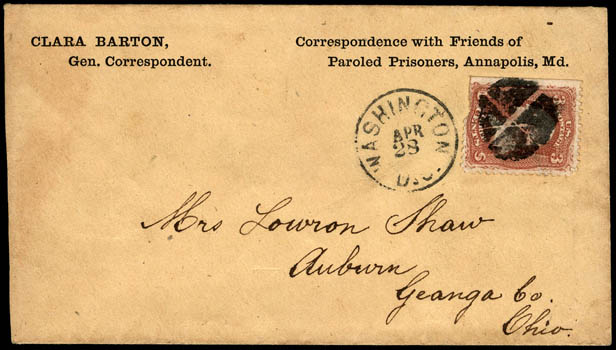

Lot
1636 
Confederacy, Clara Barton, Gen. Correspondent - Correspondence Office with Friends of Paroled Prisoners, Annapolis, Md., printed corner card cover to Auburn, O., franked with 1861, 3¢ rose (flaw) canceled by "Washington, D.C., Apr 28" cds and quartered cork duplex, with original enclosure of a printed form letter datelined "April 27, 1865" and signed by Clara Barton in the hand of her assistant Jules Golay (a young Swiss volunteer) with note reading…Your communication of March 28 is received, and the name of Shaw Delos, Co. E 102 Ohio has been placed upon my lists. It will constitute my most earnest endeavor to bring these lists within the notice of returned prisoners everywhere. Be assured that as soon as any information of interest to yourself is gained, it will be most promptly and cheerfully forwarded to you., Extremely Fine; with 2017 P.F. certificate. Scott No. 65 Estimate $1,500 - 2,000.
A REMARKABLE MISSING PRISONER OF WAR NOTICE BY CLARA BARTON - LATER TO BE FOUNDER OF THE AMERICAN RED CROSS.
After the end of the American Civil War, Clara Barton discovered that thousands of letters from distraught relatives to the War Department were going unanswered because the soldiers they were questioning about were buried in unmarked graves. Many of these soldiers were labeled just as "missing". Motivated to do more about the situation, Miss Barton contacted President Lincoln in hopes that she would be allowed to respond officially to these unanswered inquiries. She was given permission, and "The Search for the Missing Men" commenced.
After the war, she ran the Office of Missing Soldiers in Washington, D.C. The office's purpose was to find or identify soldiers killed or missing in action. Barton and her assistants (including Jules Foley who is given credit in letter) wrote 41,855 replies to inquiries and helped locate more than twenty-two thousand missing men. Barton spent the summer of 1865 helping find, identify, and properly bury 13,000 individuals who died in Andersonville prison camp, a Confederate prisoner-of-war camp in Georgia. The union soldier in the above notice was one of these prisoners of Andersonville, and was paroled on April 18th shortly before Barton's letter of reply was written.
She continued this task over the next four years, burying 20,000 more Union soldiers and marking their graves. Congress eventually appropriated $15,000 toward her project.
Realized: $2,900
